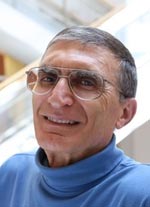Why are some of us early birds or night owls?

Dr. Aziz Sancar is a Sarah Graham Kenan Professor of Biochemistry and Biophysics at the UNC School of Medicine, as well as a member of the National Academy of Sciences and the Turkish Academy of Sciences. Here, he gives insight into the circadian clock - the biological rhythms that could explain why some people last all New Year's Eve and others are asleep before midnight. Questions and answers have been edited.
Q: What exactly is the circadian clock?
The circadian clock is an innate rhythm of 24 hours. The clock works at the molecular level to "turn on" or "turn off" the expression of proteins controlling the bodily functions that make you sleepy or awake. The clock continues despite environmental cues, so even if you put a person in constant darkness they will still follow the same rhythm of sleeping and waking.Q: How does the circadian clock affect mental and physical health?
Because of the circadian clock, blood pressure goes up really rapidly in the morning from around 6 to 11 a.m., and that is when people have the most strokes and heart attacks. The circadian clock also controls the repair of DNA damage that can come from environmental exposures, such as the UV radiation in sunlight. We have found that the time of day that you go to the beach or visit a tanning booth can actually influence the onset of skin cancer. For example, our research suggests that the sun's rays are safer in the early morning than in the late afternoon. You name it, the circadian clock controls it. And if it gets out of whack, you can be susceptible to a number of different diseases.
Q: What do we know about the genetics of the circadian clock?
There are four core "clock" genes, and they are called clock, BMAL1, cryptochrome and period. Clock and BMAL1 "turn on" other genes within the human genome, whereas cryptochrome and period "turn off" other genes. On average, about 10 percent of all of our genes are controlled by the clock.
Q: If this process is innate, then why are some people night owls whereas others are early birds?
Even though those four genes generate the main clock, there are many other genes that subtly influence it in one direction or the other. All humans are diurnal - meaning that we are active during the day. Before sunup, the clock starts getting us ready for the day by increasing our steroid level, increasing our blood pressure, dropping our melatonin levels and raising our body temperature. But the genetic and biochemical differences among individuals mean that this process can start later for some people than others.
Story originally published in The N&O
Dr. Sancar is a recent winner of the Nobel Prize in Chemistry. More here »
- Created on .